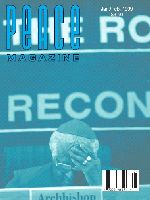
Peace Magazine Jan-Feb 1999, page 29. Some rights reserved.
Search for other articles by David Mcreynolds here
Here are excerpts of an analysis by a prominent American peace activist concerning the American attack on Iraq in December.
Our horror at weapons of mass destruction is used by Clinton and Albright to make us look only at Iraq, not at similar weapons (nuclear) held by Israel, or the U.S.'s nuclear weapons. Our horror at human rights abuses - which abound in Iraq - is used by people such as Albright to paint Saddam Hussein as Satan incarnate, conveniently forgetting that in Indonesia today the United States gives full support to a ruthless and corrupt government engaged in massive human rights abuses (of which East Timor is only one example). They assume that we won't do our homework, that we will not remember that Amnesty International, during the reign of the Shah of Iran, issued a blistering report that Iran had "the highest rate of death penalties in the world, no valid system of civlian courts and a history of torture which is beyond belief." That was a government the U.S. put in place, armed, and supported.
For those who are just entering the movement of "protest and struggle" it is important both to see that Saddam Hussein is undemocratic and ruthless - and also that he is a man who had the active support of the U.S. government when he engaged in a war in which a million lost their lives. Did the State Department call him a "mad man" then? Did they worry that chemical weapons might get into his hands? On the contrary, they gave him support, they shipped him the material.
The conflict with Iraq is rooted in U.S. economic and power interests, not in any interest in human rights or any U.S. fear of germ warfare....
The U.S. effort to control raw materials and oil is something any great power would do if it had the military force. It is in the nature of "power politics" as we understand them. ...
The Russian opposition to the U.S. actions is based on a very clear understanding of the power politics involved. The Russians can see clearly that if the United States can unilaterally (with the nominal help of Britain, Canada, Australia, and the blessing of Kuwait and Israel) change the government of Iraq to one that better suits its purpose, then it can do the same thing anywhere in the world.
Acting outside the U.N. Framework
The U.S., by acting outside the framework of the United Nations (while claiming to be carrying out old agreements which, themselves, were coerced) is seen as a threat to the national independence of all nations. And on this the Russians are right. As are the French and the Chinese. When they oppose Clinton they are doing so not because they support Saddam but because they fear the unlimited power of the "sole super power in the world." ...
But the real decisions are made by the foreign policy experts around the Council on Foreign Relations, the "think tanks" which coordinate U.S. political and economic policy. Bill Clinton came to office to reflect precisely this grouping within the Democratic Party, a grouping with ties to Wall Street. Decisions are not made by Congress, nor by public debate. ...
So any hope that a "moral appeal" to Clinton will work is wasted. What will work is organization, pressure, people in the streets, people meeting with their members of Congress. Clinton, to a great extent, is no more relevant to the current crisis than Saddam. There is not the slightest evidence on the record that Clinton - a smart, well informed man - has the courage to buck the powers that put him in office.
To the degree the peace movement gets dragged off into discussing which sanctions to keep and which to lift, it has been outmaneuvered. Lift them all. Did Saddam cheat? Of course. Did the Israelis cheat on the Oslo Accords? Of course. (So, for that matter, did Arafat). What we have now is "selective enforcement" and "selective morality." The best answer the peace movement can give is that until there are inspections of all sites for nuclear and biological weapons we refuse absolutely to permit the U.S. to dictate the conditions of any such inspections.
David McReynolds works with the War Resisters League in New York.

Peace Magazine Jan-Feb 1999, page 29. Some rights reserved.
Search for other articles by David Mcreynolds here